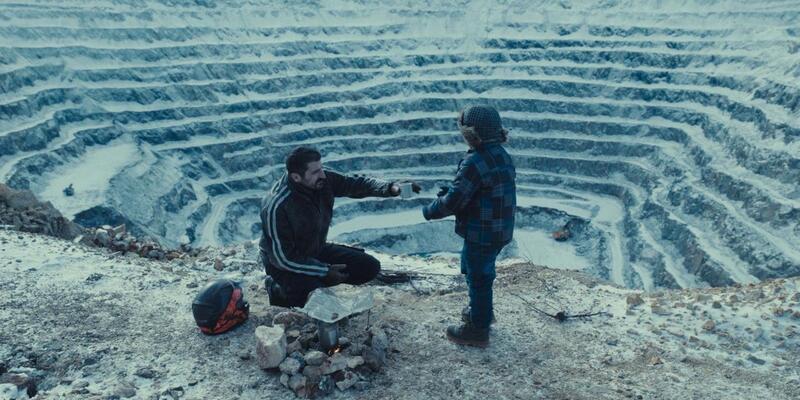
Review by
Eric Hillis
Directed by: Cristian Mungiu
Starring: Marin Grigore, Judith State, Macrina Bârlădeanu, Orsolya Moldován

R.M.N., the title of Cristian Mungiu's latest cinematic state of the
Romanian nation address, might seem like an abbreviation of the country
itself but the filmmaker has claimed it refers to an acronym that
translates to English as "nuclear magnetic resonance." It may be
specifically Romanian in its setting of a small Transylvanian village,
but its theme of xenophobia and capitalist exploitation will resonate
across all of Europe, and no doubt far beyond.
There are two key allusions to Asian cinema in Mungiu's film. A budding
cellist is teaching herself to play the theme from Wong Kar-Wai's
In the Mood for Love throughout. The central narrative is
essentially a reworking of Kurosawa's Yojimbo, with Toshiro Mifune's samurai replaced by an apolitical brute who
finds himself torn between two sides of our current culture war.

The brute is Matthias (Marin Grigore), a half-German Romanian
man who flees his job at a German slaughterhouse after assaulting a
co-worker who called him a "lazy gypsy." Matthias makes his way back to
his home village in Transylvania where he receives a cold welcome from
his estranged young wife Ana (Macrina Bârlădeanu), who has been
left to raise their now eight-year-old son Rudi (Mark Blenyesi).
In the movie's prologue we watched as Rudi reacted in horror to some off
screen incident, and the child has been left dumbstruck since. Matthias
is unhappy with what he views as Ana's mollycoddling of the child and so
he takes it upon himself to teach the boy how to be a man. In Matthias's
outdated worldview, this means always being ready for a fight.
As the movie progresses however, we begin to wonder if maybe Matthias
has a point. Teaching physical aggression to a child shouldn't be
encouraged, but it becomes clear that when it comes down to it, many of
the world's problems come down to men and women being unable to fight
for their beliefs. Matthias doesn't seem to have any beliefs, and so
when the village becomes split regarding the hiring of three Sri Lankan
immigrants at a local bakery, he keeps his head down and tries not to
get involved.

This isn't so easy, as his lover, Csilla (Judith State), is the
manager of the bakery in question. The attractive, educated, middle
class Csilla and the bestial Matthias may seem an unlikely pairing, but
with most of the town's men having left to seek work elsewhere, pickings
are slim. Matthias reingratiates himself to Csilla in the creepiest of
ways, hanging outside her back door like Michael Myers stalking a
babysitter, but she gives in eventually with a tired resignation. In
their post-coital small talk, Csilla seems to prod Matthias for an
expression of commitment. The subtext is that she's not simply referring
to their relationship, but that she wants him to commit to something,
anything, rather than walking between life's factions with his head
down.
In a scene reminiscent of Ken Loach at his best, the villagers gather
at a local hall to trash out the issue of the immigrants. Mungiu stages
the scene in a single stationary take. As insults are hurled and points
are made vociferously, Matthias sits silently clutching the embarrassed
Csilla's hand. When a vote is called for, he raises his hand because he
sees Csilla do likewise, but he has no idea what he just voted for.
Depending on your point of view, Matthias is either the real
villain of R.M.N., because he has no principles either way, or a Forrest Gump-esque
innocent who simply wants to be with the woman he loves in a world gone
mad. He's either too dumb to parse his own xenophobic victimisation
while working abroad or clever enough to know it's a battle best
avoided. When Matthias returns to the village the local pastor asks if
he can slaughter his pig. Matthias is clearly seen by others as a man
who isn't afraid to get his hands bloody, but maybe he's tired of doing
others' dirty work.

The pivotal town hall scene sees the film's themes come to the fore.
The opponents of immigration make a lot of bigoted talking points (the
old fear of having dark hands touching food is a key point), but at the
same time Csilla and her boss are guilty of paying wages too low for the
locals to live on. Both sides make arguments that will have your blood
boiling if you're anyway left of the centre in your politics, but it's a
battle that's being directed at the wrong target in both cases. Both
sides are victims of a capitalist system allowed to run rampant, with
the bakery offering wages so low they can only employ immigrants
accustomed to third world conditions, while its owner drives a Mercedes
(as, tellingly, does the local pastor who acts as the articulate front
for the anti-immigrant revolt). Ironically, in Western Europe it's
Romanians who are often blamed for a similar injustice.
Early on we watched as Matthias taught his son how to boil water in the
woods. Our initial thought is that this is a skill the boy will never
need, but by the end of the film we reluctantly concede that Matthias
might be onto something. Living in the woods might be preferable to the
conditions currently offered by so-called civilisation.


